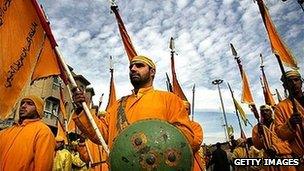What is Ashura?
- Published

Ashura ceremonies mark the death in battle of Imam Hussein, grandson of the Prophet Muhammad
The day of Ashura is marked by Muslims as a whole, but for Shia Muslims it is a major religious commemoration of the martyrdom at Karbala of Hussein, a grandson of the Prophet Muhammad.
It falls on the 10th of Muharram, the first month of the Islamic lunar calendar.
It is marked by Muslims with a voluntary day of fasting which commemorates the day Noah left the Ark, and the day that Moses was saved from the Egyptians by God.
For Shia Muslims, Ashura is a solemn day of mourning the martyrdom of Hussein in 680 AD at Karbala in modern-day Iraq.
It is marked with mourning rituals and passion plays re-enacting the martyrdom.
Shia men and women dressed in black also parade through the streets slapping their chests and chanting.
Some Shia men seek to emulate the suffering of Hussein by flagellating themselves with chains or cutting their foreheads until blood streams from their bodies.
Some Shia leaders and groups discourage the bloodletting, saying it creates a backward and negative image of Shia Muslims. Such leaders encourage people to donate blood.
Islamic schism
The killing of Hussein was an event that led to the split in Islam into two main sects - Sunnis and Shias.
In early Islamic history the Shia were a political faction (known as the "party of Ali") that supported Ali, son-in-law of the Prophet Muhammad and the fourth caliph (temporal and spiritual ruler) of the Muslim community.
The great schism between Sunnis and Shias occurred when Imam Ali did not succeed as leader of the Islamic community at the death of the Prophet.
Ali was murdered in AD 661 and his chief opponent Muawiya became caliph.
Caliph Muawiya was later succeeded by his son Yazid, but Ali's son Hussein refused to accept his legitimacy and fighting between the two resulted.
Hussein and his followers were massacred in battle at Karbala.
Both Ali's and Hussein's deaths gave rise to the Shia cult of martyrdom and to their sense of betrayal and struggle against injustice, oppression and tyranny.
Today, Shias comprise about 15% of the total worldwide Muslim population.